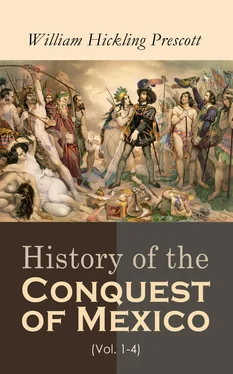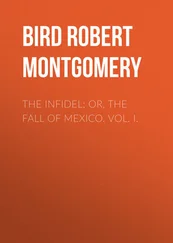In pursuit of this double object, he penetrated into the remotest parts of the country, living much with the natives, passing his nights sometimes in their huts, sometimes in caves and the depths of the lonely forests. Frequently months would elapse without his being able to add anything to his collection; for the Indians had suffered too much not to be very shy of Europeans. His long intercourse with them, however, gave him ample opportunity to learn their language and popular traditions, and, in the end, to amass a large stock of materials, consisting of hieroglyphical charts on cotton, skins, and the fibre of the maguey; besides a considerable body of Indian manuscripts, written after the Conquest. To all these must be added the precious documents for placing beyond controversy the miraculous apparition of the Virgin. With this treasure he returned, after a pilgrimage of eight years, to the capital.
His zeal, in the mean while, had induced him to procure from Rome a bull authorizing the coronation of the sacred image at Guadaloupe. The bull, however, though sanctioned by the Audience of New Spain, had never been approved by the Council of the Indies. In consequence of this informality, Boturini was arrested in the midst of his proceedings, his papers were taken from him, and, as he declined to give an inventory of them, he was thrown into prison, and confined in the same apartment with two criminals! Not long afterward he was sent to Spain. He there presented a memorial to the Council of the Indies, setting forth his manifold grievances, and soliciting redress. At the same time, he drew up his “Idea,” above noticed, in which he displayed the catalogue of his museum in New Spain, declaring, with affecting earnestness, that “he would not exchange these treasures for all the gold and silver, diamonds and pearls, in the New World.”
After some delay, the Council gave an award in his favor; acquitting him of any intentional violation of the law, and pronouncing a high encomium on his deserts. His papers, however, were not restored. But his Majesty was graciously pleased to appoint him Historiographer-General of the Indies, with a salary of one thousand dollars per annum. The stipend was too small to allow him to return to Mexico. He remained in Madrid, and completed there the first volume of a “General History of North America,” in 1749. Not long after this event, and before the publication of the work, he died. The same injustice was continued to his heirs; and, notwithstanding repeated applications in their behalf, they were neither put in possession of their unfortunate kinsman’s collection, nor received a remuneration for it. What was worse,—as far as the public was concerned,—the collection itself was deposited in apartments of the vice-regal palace at Mexico, so damp that they gradually fell to pieces, and the few remaining were still further diminished by the pilfering of the curious . When Baron Humboldt visited Mexico, not one-eighth of this inestimable treasure was in existence!
I have been thus particular in the account of the unfortunate Boturini, as affording, on the whole, the most remarkable example of the serious obstacles and persecutions which literary enterprise, directed in the path of the national antiquities, has, from some cause or other, been exposed to in New Spain.
Boturini’s manuscript volume was never printed, and probably never will be, if indeed it is in existence. This will scarcely prove a great detriment to science or to his own reputation. He was a man of a zealous temper, strongly inclined to the marvellous, with little of that acuteness requisite for penetrating the tangled mazes of antiquity, or of the philosophic spirit fitted for calmly weighing its doubts and difficulties. His “Idea” affords a sample of his peculiar mind. With abundant learning, ill assorted and ill digested, it is a jumble of fact and puerile fiction, interesting details, crazy dreams, and fantastic theories. But it is hardly fair to judge by the strict rules of criticism a work which, put together hastily, as a catalogue of literary treasures, was designed by the author rather to show what might be done, than that he could do it himself. It is rare that talents for action and contemplation are united in the same individual. Boturini was eminently qualified, by his enthusiasm and perseverance, for collecting the materials necessary to illustrate the antiquities of the country. It requires a more highly gifted mind to avail itself of them.
Table of Contents
THE TEZCUCANS—THEIR GOLDEN AGE—ACCOMPLISHED PRINCES—DECLINE OF THEIR MONARCHY
THE reader would gather but an imperfect notion of the civilization of Anahuac, without some account of the Acolhuans, or Tezcucans, as they are usually called; a nation of the same great family with the Aztecs, whom they rivalled in power and surpassed in intellectual culture and the arts of social refinement. Fortunately, we have ample materials for this in the records left by Ixtlilxochitl, a lineal descendant of the royal line of Tezcuco, who flourished in the century of the Conquest. With every opportunity for information he combined much industry and talent, and, if his narrative bears the high coloring of one who would revive the faded glories of an ancient but dilapidated house, he has been uniformly commended for his fairness and integrity, and has been followed without misgiving by such Spanish writers as could have access to his manuscripts. [264]I shall confine myself to the prominent features of the two reigns which may be said to embrace the golden age of Tezcuco, without attempting to weigh the probability of the details, which I will leave to be settled by the reader, according to the measure of his faith.
The Acolhuans came into the Valley, as we have seen, about the close of the twelfth century, and built their capital of Tezcuco on the eastern borders of the lake, opposite to Mexico. From this point they gradually spread themselves over the northern portion of Anahuac, when their career was checked by an invasion of a kindred race, the Tepanecs, who, after a desperate struggle, succeeded in taking their city, slaying their monarch, and entirely subjugating his kingdom. [265]This event took place about 1418; and the young prince, Nezahualcoyotl, the heir to the crown, then fifteen years old, saw his father butchered before his eyes, while he himself lay concealed among the friendly branches of a tree which overshadowed the spot. [266]His subsequent history is as full of romantic daring and perilous escapes as that of the renowned Scanderbeg or of the “young Chevalier.” [267]
Not long after his flight from the field of his father’s blood, the Tezcucan prince fell into the hands of his enemy, was borne off in triumph to his city, and was thrown into a dungeon. He effected his escape, however, through the connivance of the governor of the fortress, an old servant of his family, who took the place of the royal fugitive, and paid for his loyalty with his life. He was at length permitted, through the intercession of the reigning family in Mexico, which was allied to him, to retire to that capital, and subsequently to his own, where he found a shelter in his ancestral palace. Here he remained unmolested for eight years, pursuing his studies under an old preceptor, who had had the care of his early youth, and who instructed him in the various duties befitting his princely station. [268]
At the end of this period the Tepanec usurper died, bequeathing his empire to his son, Maxtla, a man of fierce and suspicious temper. Nezahualcoyotl hastened to pay his obeisance to him, on his accession. But the tyrant refused to receive the little present of flowers which he laid at his feet, and turned his back on him in presence of his chieftains. One of his attendants, friendly to the young prince, admonished him to provide for his own safety, by withdrawing, as speedily as possible, from the palace, where his life was in danger. He lost no time, consequently, in retreating from the inhospitable court, and returned to Tezcuco. Maxtla, however, was bent on his destruction. He saw with jealous eye the opening talents and popular manners of his rival, and the favor he was daily winning from his ancient subjects. [269]
Читать дальше












